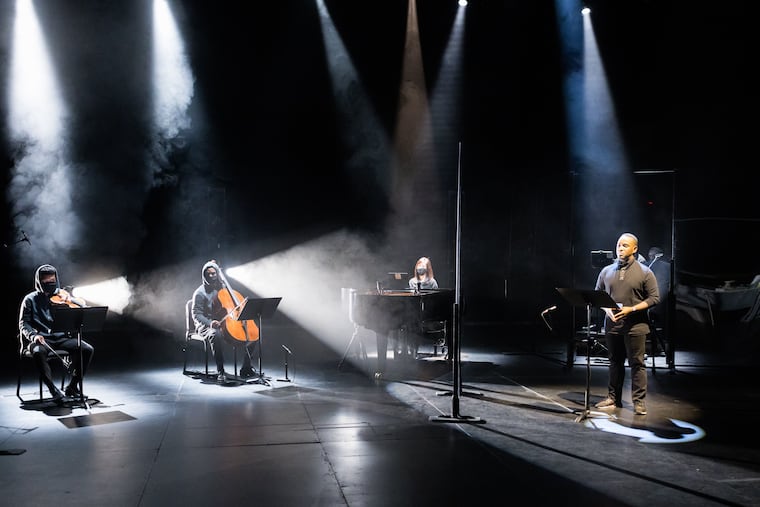‘Cycles of My Being,’ about the modern lives of Black men, speaks more urgently than ever in new digital performance
The 2018 song cycle is being reprised beginning Friday as the next installment in Opera Philadelphia's digital season.

Works of art regularly seem to rewrite themselves in ways that comment on current circumstances. It’s really what they’re for. And that’s especially true of Cycles of My Being, the uncompromising 2018 song cycle that portrays the modern lives of Black men, co-commissioned by Opera Philadelphia and returning as the next installment in the company’s digital season, starting at 8 p.m. Friday.
When first announced years back, the project seemed to bring composer Tyshawn Sorey and poet Terrance Hayes out of their distant artistic niches and into one sphere, piloted by star tenor Lawrence Brownlee. It world premiered in Philadelphia on Feb. 20, 2018.
» READ MORE: Lawrence Brownlee in 'Cycles of My Being': 'Hold on to your seats'
Amid the urgency of the Black Lives Matter movement, the piece is a natural choice to be reprised, especially since Sorey is a now major composer (his violin concerto, For Marcos Balter, was recently premiered by the Detroit Symphony) and poet Hayes enjoys a rising profile consolidated by his acclaimed 2018 “American Sonnet for My Past and Future Assassin.”
The new video, which will be available on demand for six months, was filmed Sept. 22-24 at the Wilma Theater, not in its piano/vocal incarnation but with Brownlee surrounded by a four-piece chamber ensemble with the composer conducting.
Director Leslie Rivera created a stark black-and-white look with each musician in intersecting pools of light, some with their faces partially obscured by hoodies. As Brownlee prepares to sing — and he does so with his usual passion and precision — sketches of George Floyd and Emmett Till are tucked in the back of his score.
As experimental as both creators are, this piece reflects a strong desire for immediate communication. Hayes can be pretty raw; here, he is very much to the point. Words such as “breath” and “oxygen” now take on extra meaning. Sorey can be highly oblique, but in this piece he writes highly singable vocal lines; the instrumental writing (piano, cello, clarinet, and violin) uses whatever musical means are necessary to penetrate deep into the psychology of the words, going well below the surface in the piece’s exploration of racial injustice.
Central to the six-song cycle are “Hate” and “Each Day I Rise” — both so ambitious that they’re more like movements than songs.
“Hate” is built on hushed, almost hidden microtonal string chords that nag at your ears, feeling almost like a disease that exists inside of everything. Stabbing chords suggest more explicitly where hate leads. In the music, hate is mostly portrayed as shapeless and amorphous — a toxic underpinning. The words talk about external hate being an expression of inner self hate.
“Each Day” begins like a spiritual, with Brownlee singing a capella and the instrumentalists doubling as singers, almost like a congregation, but then Brownlee’s vocal lines become more extravagant, seeming to proclaim certainty in one minute but searching with a bit of doubt in the next.
Later in the song, the more stately but somewhat unstable piano chords sound like a hymn in search of a religion it hasn’t yet found. Sorey’s most experimental side comes out in a clarinet solo that goes to extremes, both in terms of range and rhetoric. In the post-performance discussion, Brownlee described that moment as “angry.” Others heard something more complicated, like a testimony.
So it is with Cycles of My Being. Though some works convey their messages with the kind of music that urges the listener to walk miles in someone else’s shoes, Cycles of My Being asserts itself in ways that are more likely to allow a communion among souls.
No surprise, then, that during the post-performance discussion, composer Sorey talks about having lived with and absorbed the words so completely before actually composing, he felt “the piece had already been written.”
Cycles of My Being is available on-demand with a Season Pass until May 31, 2021, or with a seven-day rental for $20 that begins at 8 p.m. Nov. 20. Information: operaphila.tv